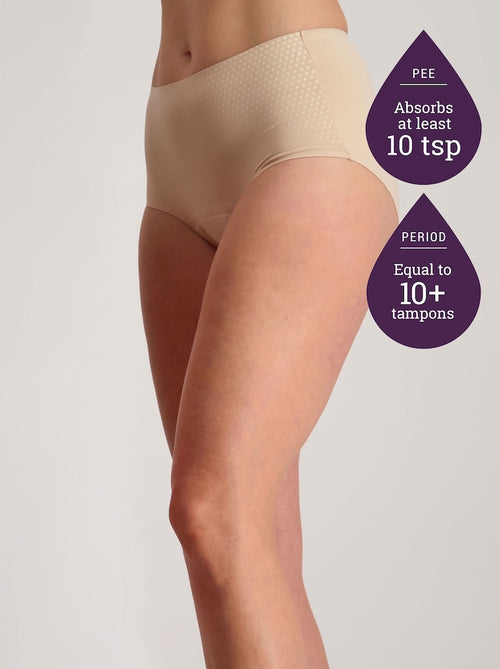Turns out that when your bowel isn’t working properly your bladder can be affected. Who knew?
Why does constipation affect bladder leakage?
The bowel sits extremely close to the bladder, and when it gets too full the extra weight puts pressure on the bladder. This can result in – you guessed it – unwanted leaks.
This pressure means the bladder can’t hold as much as it normally can, resulting in stress incontinence (caused by physical pressure or exertion) or overflow incontinence (when the bladder releases urine involuntarily because it’s too full).
For women especially, being constipated and having to strain to poop can reduce your pelvic floor strength and reduce your bladder’s ability to hold onto urine.
How do I know if I’m constipated?
It’s likely you have some degree of constipation if you:
- have to strain excessively to poop
- have very lumpy or hard poos
- eat a lot of processed foods
- poop fewer than three times a week
- feel like something might be stuck ‘up there’
- feel like your bowel is never fully emptied
What causes constipation?
Constipation can be caused by several different things, including:
- lack of fibre in your diet
- dehydration
- stress
- lack of exercise
- long-term medication
- a change of diet
- holding on for too long (which causes your body to absorb too much water from fecal matter, and results in a slow-moving, dry and uncomfortable stool)
How can I manage constipation?
Constipation can be a side effect of some medical conditions, which is why it always pays to see your doctor if you’re concerned.
Laxatives are often the first course of treatment doctors will recommend. They are a type of drug or natural stimulant that catalyses bowel movements. There are many different types of laxative, and your doctor will recommend the best type depending on the type of constipation you’re experiencing.
You can, of course, make changes to your lifestyle to try to manage constipation – and to do this, simply reverse the list of causes listed above:
- add more fibre to your diet (make sure you’re eating leafy greens, oats and beans)
- stay hydrated (water is an essential component of the digestion process and keeps your body moving)
- reduce stress by meditating and getting enough sleep
- enjoy a fit and active lifestyle (physical activity assists with food processing and helps to trigger intestinal movements)
- talk to your doctor about whether your medication could be causing constipation
- take measures to ensure you’re eating well and regularly, especially when you’re busy
- when you feel the need to go number two – go! This reduces the likelihood that your stool will become dry and lumpy, and increases the chances of it passing through your body in its entirety
I’ve sorted out my constipation, but it hasn’t solved by bladder problem
Hopefully, once the issue of constipation is under control, your bladder feels more manageable as a result. However, if your bowels are moving as nature intended and you’re still experiencing
bladder leakage
, it could be sign that there’s something else going on in your body that needs addressing.
The pelvic floor is a complex area and the bladder can be affected by many different life experiences, including injury and illness. Therefore, the best step is to talk to your health professional about your experiences so they can create a plan of attack specific to your needs.
And while you’re working to regain control, Confitex







